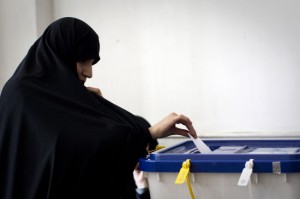 (Reuters) - Iranian voters appeared to turn out in large numbers on Friday to choose a new president despite a limited choice of one relative moderate and five hardline conservatives, with long queues forming outside polling stations.
(Reuters) - Iranian voters appeared to turn out in large numbers on Friday to choose a new president despite a limited choice of one relative moderate and five hardline conservatives, with long queues forming outside polling stations.Supreme Leader Ayatollah Ali Khamenei urged Iranians to participate in force in the vote, damning U.S. officials who criticized the fairness of the election.
Reuters journalists were not granted visas to cover the vote but witnesses who visited several polling stations in the capital Tehran early in the day said there were more people waiting to vote than at the previous election in 2009.
Interior Minister Mostafa Mohammad Najjar told state Press TV there had been a large turnout across the country in response to the leader's call.
"They want to stand against the enemy," he said. Israel, the United States and their allies, who accuse Tehran of seeking to develop nuclear weapons, top Iran's list of foes.
The interior ministry extended voting time by several hours, Press TV said, due to the large number of voters waiting outside polling stations.
Iranian analysts said a big turnout could benefit the sole moderate conservative candidate Hassan Rohani, since some of his natural supporters in the urban middle class had been toying with abstention.
Rohani's call to rehabilitate Iran's foreign relations and enact a "civil rights charter" has resounded with many Iranians eager for change.
But some reformists said they were still doubtful about voting after the experience of 2009 when reformist leaders said the election was stolen from them to return President Mahmoud Ahmadinejad to office. The government denied rigging the count.
"I am standing in line right now to vote. Making up my mind about voting or staying away was a struggle for me," said Shaqayeq, a student in Tehran. "Most reformists have urged us to vote and therefore I decided to vote too. For Rohani."
Mahnaz, a Tehran artist, was still agonizing.
"I am still not sure if I want to vote or not. I still remember what happened four years ago and that angers me," she said. "But a part of me still believes voting is important ... If I decide to vote I will vote for Rohani because he is the only moderate among the candidates."
Mansour Sanatipour, 56, a policeman from the southern port of Bandar Abbas, voting in Dubai, said he too was voting for Rohani. "He wants to reform the economic and political system, and he will improve Iran's international relations," he said.
"WE LOVE THE SYSTEM"
The failure of the hardline so-called "Principlists" to unite behind a single candidate could mean the conservative vote is split, raising the likelihood of a run-off in a week's time.
With no independent, reliable opinion polls in�Iran�it is hard to gauge which way the ballot will go, let alone the extent to which Khamenei, the Revolutionary Guards and the Islamic Basij militia will exert their powerful influence over the vote.
One Basij militiaman, Hossein, 27, said he was voting for Saeed Jalili, Iran's chief nuclear negotiator who is alone among the candidates in defending Tehran's current uncompromising stance in talks with world powers and an ideologically driven foreign policy.
"I will certainly vote for Jalili. He is the only one I can trust to respect the values of the revolution. The supreme leader trusts him so much that he leads Iran's nuclear negotiations," said Hossein in Tehran.
"Jalili is also the only candidate who won't be affected by international pressure on Iran," he said.
A young woman wearing a long black chador who declined to give her name also said she was voting for Jalili.
"I voted to support the system. We love the system. God willing Mr. Jalili will be elected."
But others said they would vote for Mohammad Baqer Qalibaf, the mayor of the Iranian capital, due to his track record of improving transport and infrastructure in the sprawling city.
"I am voting for Qalibaf because he made a difference in Tehran," said Soroush, a 29 year-old student. "He has worked hard since he became Tehran mayor and I think he is someone we can count on."
Even people from outside Tehran said they were impressed with the no nonsense, hard-working attitude of the mayor, a former national police chief.
"Qalibaf really built Tehran," Reza Sarvestani, 48. "I'm from the provinces, and when I travel to Tehran I'm amazed."
By Reuters
The Iran Project is not responsible for the content of quoted articles.










